- Home
- Patricia MacLachlan
Word After Word After Word Page 2
Word After Word After Word Read online
Page 2
“There can never be too many verys about this,” said May.
“Your mother is not dumb. She’s smart,” I said.
“Until now she was smart,” said May.
“There’s one thing,” I said.
“What?” grumped May.
“You have something to write about,” I said. “And I sure wouldn’t mind having a brother or sister.”
“Get a cat,” said May.
She glared at me and stomped to her seat.
Ms. Mirabel watched her. Ms. Mirabel wore purple today. Everything was purple: her skirt, her top, her shoes, her headband that failed at holding back that hair.
“Is there trouble?” she asked.
“A new baby at May’s house,” said Hen. “Her parents are adopting.”
“Ah,” said Ms. Mirabel.
I thought about Evie’s father saying “ah.”
“Does May have any brothers and sisters?”
“Four sisters. May is the youngest one.”
Ms. Mirabel smiled.
“I remember loathing my baby brother.”
“Like outlines,” said Hen.
“Like outlines,” she repeated.
“You probably love him now. Right?” I said to her.
She looked at me as if surprised at the question.
“Your brother,” I repeated.
Ms. Mirabel sighed. “No, Lucy. He’s not a very nice person, as it turns out.”
Ms. Mirabel shook her head as if chasing away thoughts. She looked at the class, everyone sitting quietly now.
“Let’s read!” she said. “Russell? Did someone whisper to you?”
Russell got up and stood at his desk. The paper shook a bit in his hand.
“Yes.”
“And who whispered to you?”
“My dog,” said Russell. “Just before he died.”
I’ll fly away
Above the big maple tree
Where I peed every day.
I’ll fly away
Above the garden
Where I dug up carrots
And radishes
Where I rolled in something
Bad smelling.
I liked running with you
And chasing balls
And sleeping under your quilt.
But now
I’ll fly away.
—Russell
Chapter 6
Russell ducked under Hen’s big lilac bush. We were five today. It was late afternoon, and shadows fell across the yard.
Russell wore a pack.
“What is that?” asked May loudly.
Inside the pack was a baby.
“My brother, Oliver,” said Russell. “You’ve seen him before.”
“I don’t like babies,” said May.
Russell smiled. He took Oliver out of his pack and sat him on his lap. “You’ll like Ollie,” he said. “There is not one bad thing about him.”
And as if Oliver had heard Russell, he smiled and pumped his arms up and down.
“I babysit for Ollie every day after school.”
Hen reached out and took Oliver’s hand.
“That’s why you don’t play soccer?”
Russell nodded.
Oliver grinned and then reached out to May. May drew back.
“He likes you,” said Russell. “Here.” He handed Oliver over to May, who held him away from her, as if he were a package of trash. But Oliver didn’t care. He leaned closer and closer to May until his head lay on her shoulder. Slowly, May put her arms around him and closed her eyes.
“I think he’s wet,” she whispered finally.
“Of course he’s wet,” said Russell cheerfully. “He’s always wet. My babysitting time is over pretty soon. I’ll take him home and change him.”
May still held on to Oliver. She didn’t open her eyes. And when she did, she whispered to Russell again.
“That was a beautiful poem about your dog, Russell.”
Russell nodded and picked up Oliver. He ducked out from under the bush and put Oliver back in his pack.
“He was a good dog,” he said softly.
“What was his name?” asked May.
“Everett,” said Russell before he disappeared in the shadows.
There is a soft sweet smell here. The smell of somewhere far away I may have been one time but can’t remember.
It is a soft sweet smell.
Why is it I know it? Why is it so familiar?
I can almost reach out my hand to catch it.
But not quite.
—May
Chapter 7
My house was quiet. No music, no conversation, no laughing. I closed the door and walked down the hallway into the living room. My mother was staring at herself in the mirror. She did that a lot these days, since she had lost her hair from chemo. She saw me looking at her looking at herself.
“What do I look like, Lucy?” she asked me. “I look like something.”
“An ostrich,” I said.
Mama smiled.
“I do,” she said.
She took a breath.
“What happened at school today? How is the beautiful and creative Ms. Mirabel?” she asked.
“She is beautiful and creative,” I said.
“And how is that hair?”
“Robust,” I said.
I smiled at her because she knew that was one of my vocabulary words.
Mama’s hair was growing back, in small fuzz all over her head. She did look a bit like an ostrich. But she said she was getting better. That’s what she said. That’s what mattered.
“Russell wrote a poem about his dog dying,” I said. “He brought his baby brother, Oliver, under the lilac bush.”
“Russell?” asked Mama. “Russell who drives Miss Cash to distraction?”
“He drives her to sighs,” I cor- rected her.
“Well, Ms. Mirabel seems to be working miracles,” said Mama. “What about you? Have you written anything for Ms. Mirabel?”
I shook my head, thinking about my poem about sadness. That’s all I wrote about these days. Sadness.
“One poem. I’m waiting for something to whisper to me.”
“Whisper? I am sure there are whispers all around you, Lucy.”
Mama turned back to look in the mirror again.
“Maybe you aren’t listening. Children hear everything. Children know everything.”
Mama and I looked at each other in the mirror for a moment. Then the front door slammed shut.
“That’s your dad,” said Mama. “How can we convince him to take us out for dinner?”
“Tell him we’re having liver.”
Mama laughed. She didn’t laugh much these days, and I liked the sound of it.
“Jack,” she called as we hurried to the kitchen. “Lucy thinks I look like an ostrich!”
“I was thinking that very same thing,” Papa called back. “What a smart girl she is!”
“And, Jack,” added Mama. “We’re having liver!”
“NO!” came a cry from the kitchen.
The moon came through my window. Soon it would begin to move away. I could hear my mother and father talking in the living room as if . . . as if nothing was wrong. I reached for my pad and pen. I would write something that would change life in my house. I would not write about sadness. Ms. Mirabel had said that she wrote to make life come out the way she wanted. Maybe I could do that, too.
Mama
Sadness. Your laughter can’t brush away the sadness here. I hear you trying to laugh. I see you trying to smile and trying to talk away the sickness.
You can’t, you know.
You can’t.
—Lucy
No use. It was still sadness. Sadness was all I had.
Chapter 8
We were under the lilac bush: Russell and Ollie, Henry, May, Evie, and I. Spring was turning into early summer. It was warm under the bush. Ollie was learning to crawl, and he pawed through the leaves and twigs beneath th
e bush. Russell watched him carefully so he wouldn’t put sticks or stones in his mouth.
“He’s getting around more now,” said Russell. “Getting into my things sometimes. He likes my shoes.”
“Like a puppy,” I said.
Russell nodded.
“And soon words will float out of his mouth like clouds,” he said. “Word after word after word, like Ms. Mirabel says.”
“That sounds like a poem,” I said to Russell.
“It does,” agreed Russell. “I will surprise you with it one day soon.”
I smiled at him.
“My mother and father are getting ready to bring home their new baby,” said May. “Theirs, not mine,” she added.
Russell laughed.
“That is mean, you know,” he said. “That baby is yours, too.”
“I know it’s mean,” said May. “But I don’t want that baby. I want Ollie.”
Ollie crawled over to May in a lurching way and offered her a stick.
“Everybody wants Ollie,” said Russell.
Inside the house we heard Junie playing music. She began to sing, her sweet voice filling the air above us. We were quiet, listening. Ollie sat back on his haunches, looking up through the leaves of the lilac bush as if looking for the song.
When Junie stopped, Ollie made a chirping noise.
“He wants more,” whispered Russell.
We were quiet, waiting.
“You know,” I said, “I’m not sure Ms. Mirabel is right. She writes to try to change her life, but that doesn’t work for me. Writing about my mother’s sickness hasn’t worked.”
“Like my father needing a new wife,” said Evie.
“And my mother’s ugly baby to come,” said May.
“My dog, Everett,” said Russell. “I know that can’t change.”
I turned to Henry.
“But you don’t write to change anything, Hen.”
Henry shook his head as his mother began singing again.
“No,” he whispered, so low we all leaned forward to hear him.
“I write to save everything I have,” he whispered.
The song
The music
The words
Flow together
To make the things I have
Stronger.
—Henry
Chapter 9
Ms. Mirabel came to class on Monday with a plastic bag filled with dirt. She took books and papers and a vase filled with flowers off the desk.
We watched as she lifted the bag and poured the dirt all over the desk. I looked at Miss Cash at the back of the room. Her eyes were wide with surprise.
“This is important to writing,” said Ms. Mirabel, ignoring our looks. “That is, it is important to my own writing. This . . .”—she paused—“is landscape! Mine.
“This dirt came from the prairie where I was a child. I played in it, dug in it, planted in it, and walked over it. It is where I began. And all my writing begins with a landscape such as this. A place.”
“The lilac bush,” said Hen out loud, making all of us smile.
“You have a landscape, do you?” said Ms. Mirabel.
“My tree house,” said May.
“The field where the white cow lives,” said Russell.
Ms. Mirabel smiled.
“You know, we don’t always write about our landscape; but we have to understand how important place is in our poetry, our stories. Your character lives in a place that helps shape that character.”
Suddenly, Ms. Mirabel looked beyond us all, to the back of the room.
“Yes? Miss Cash?” said Ms. Mirabel.
“I have a jar of ocean water on my windowsill at home,” said Miss Cash.
“Your place,” said Ms. Mirabel softly. “You see? We all have a place where we begin. And I’ll read you something I wrote about my place when I was your age.”
“Our age?” asked Russell.
“Your age, Russell. I was your age once,” said Ms. Mirabel flatly.
“The soft, silver feel of the dirt under my feet will always be there—in the wrinkles of my skin, in the beating of my heart. In every single word I ever say.”
Ms. Mirabel stopped and looked at us.
“You are a very good writer,” said Hen.
Ms. Mirabel smiled.
“You know what?” she said softly. “So are you. So are all of you.”
She took out a dustpan and brush and began sweeping up the dirt and putting it back in the bag.
Class was over.
We walked down the street without talking and along the park path on the way to Henry’s house.
“Stop,” said May suddenly. “Where’s Ollie?”
Russell smiled.
“He has a doctor’s appointment.”
“Is he sick?” asked May, looking scared.
Russell shook his head and began walking again.
“A checkup. Maybe a shot.”
May sighed.
“It isn’t the same without Ollie.”
“See,” said Hen. “You like babies.”
“I like Ollie,” said May.
Russell laughed loudly and walked ahead, shaking his head. It reminded me of when Ms. Mirabel laughed about outlines.
We walked along the winding trail and came out at Hen’s house. We crawled under the lilac bush. It was quiet again.
“It is funny to think of Ms. Mirabel at our age,” I said.
Hen lifted his shoulders.
“She said we are good writers.”
He looked at all of us.
“We are writers!”
Junie’s music started from inside, and we leaned back against the woody branches of the lilac bush.
Henry grinned.
“Writers!” Henry repeated happily.
Except for me, I thought. I’m not sure why I’m writing. My life is still about sadness.
Chapter 10
Thomas sat in the midst of the buzzing and whirring of cars. Blue cars; green, red, white; one with flames painted on the sides. Some went by themselves, running on batteries; some were wound up by hand. Late-afternoon light spread out across Evie’s bedroom.
Thomas picked up the one with flames. “My favorite,” he announced.
Hen held up the red car. “My favorite,” he said.
“Mine’s the blue,” said May.
“Green,” said Russell with feeling, making Thomas smile.
“She’s coming for dinner,” said Evie, rushing into her bedroom and leaning against the wall to catch her breath. We all looked at her. No talk, only the buzzing of cars.
“Sassy,” said Evie. Her eyes gleamed. She was excited.
“Sassy DeMello is coming for dinner?” asked Hen, smiling.
“Who is Sassy DeMello?” asked Russell.
“Evie’s father’s future wife,” said May.
“Oh.”
Evie couldn’t speak. She nodded her head up and down.
“Who’s cooking?” I asked. I had eaten Evie’s food, and it was not delicious.
“My dad. He’s making some mucky casserole.”
“My mother loves mucky casseroles,” said Hen. “She thinks they are French.”
“Your mother is the most agreeable person I know,” I said.
Hen smiled.
Evie’s dad came into the room.
“Ah . . . ,” he began, and we all burst out laughing at that.
“What’s funny?” he asked, wiping his hands on a dish towel.
“I just baked a cake,” he said. “How about that?”
“For Sassy?” asked Evie.
“Sassy?”
Evie’s father looked mystified.
“Sassy from next door.”
Evie’s father started to laugh.
“Sassy? You mean Sister Mary Grace?”
“Sister?”
Hen started to smile but stopped because he saw Evie’s face.
“Sister?” said Evie.
“You mean . . . ?” Ev
ie began to speak, then stopped.
“Sister Mary Grace. She’s a nun,” said Evie’s father. “She runs the preschool on Audubon Street. You’ll like her,” he added. An oven buzzer sounded in the kitchen. “And Mom’s coming, too,” he said as he hurried out.
Thomas looked up.
“Mama,” he said in a small voice.
He looked at Evie, still standing against the wall.
“Mama?” he repeated.
Evie didn’t speak. Slowly, she slid down to sit on the floor.
We all looked at one another, quiet, not knowing what to say.
A long time passed.
“You want to laugh,” said Evie at last.
“Oh no,” I said. “No.”
“Yes,” said Hen. “We do. And you will laugh, too.”
Evie looked up.
“Nothing will make me laugh,” she said, her voice soft.
“Something will,” said Hen.
“What?”
Hen smiled.
“Sister Sassy,” he said.
It was quiet for a moment, then we began to laugh.
“Sister Sassy DeMello,” said Hen.
And then it happened.
Evie laughed. And then, as if caught up by it, Thomas laughed, too, falling over into the colors of his cars.
Nothing is what you think.
A square is round
A circle is square
The earth is flat
The grass grows
Down,
The roots reach for
Sunlight,
Happy is sad.
And surprise!
When
Unhappiness comes
I smile.
—Evie
Chapter 11
How was it?” I whispered to Evie. “The dinner.”
We stood outside the classroom.
“All right.”
“Just a little all right? Or really all right?”
Evie looked up as if surprised at what she was about to say.
“Really all right. I told Sassy, I mean Sister Mary Grace, what I had named her. Sassy DeMello. She thought it was funny.”
“It is funny.”
“And Mama brought me a blank book for writing.”
Evie took a deep breath.
“She said she wrote poetry and stories when she was my age. She kept them, and she’ll show them to me if I want to see them.”
Evie looked at me. And what she said was very sad.

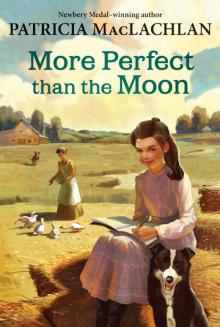 More Perfect Than the Moon
More Perfect Than the Moon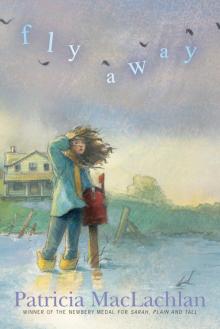 Fly Away
Fly Away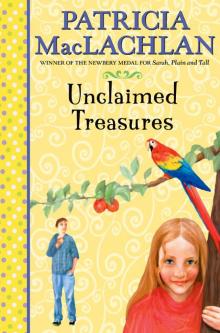 Unclaimed Treasures
Unclaimed Treasures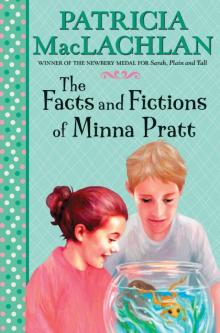 The Facts and Fictions of Minna Pratt
The Facts and Fictions of Minna Pratt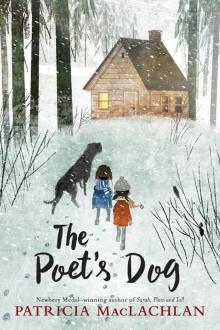 The Poet's Dog
The Poet's Dog Journey
Journey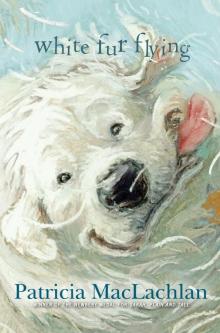 White Fur Flying
White Fur Flying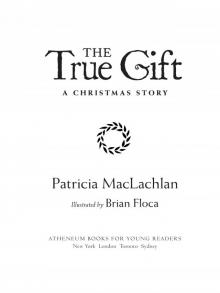 The True Gift: A Christmas Story
The True Gift: A Christmas Story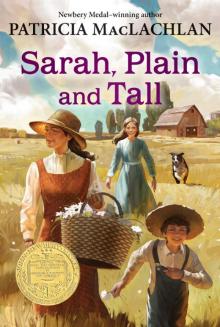 Sarah, Plain and Tall
Sarah, Plain and Tall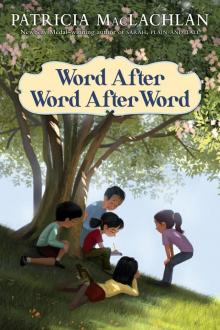 Word After Word After Word
Word After Word After Word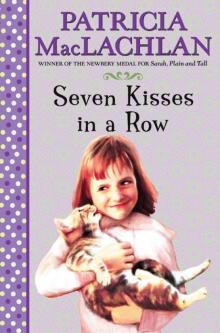 Seven Kisses in a Row
Seven Kisses in a Row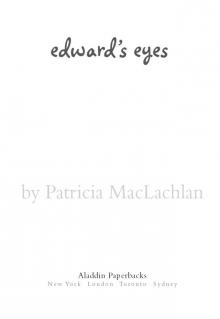 Edward's Eyes
Edward's Eyes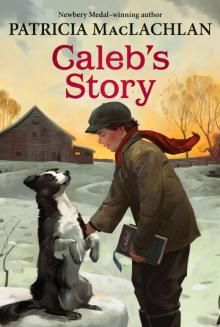 Caleb's Story
Caleb's Story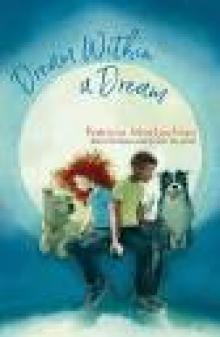 Dream Within a Dream
Dream Within a Dream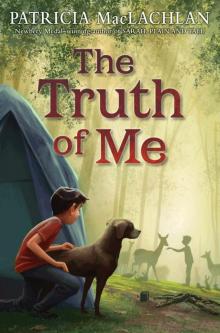 The Truth of Me
The Truth of Me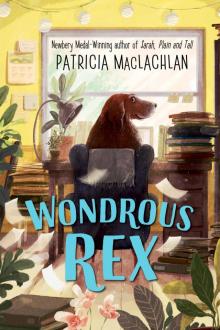 Wondrous Rex
Wondrous Rex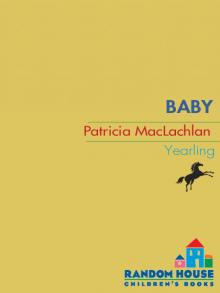 Baby
Baby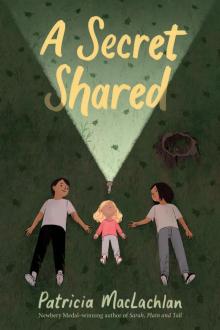 A Secret Shared
A Secret Shared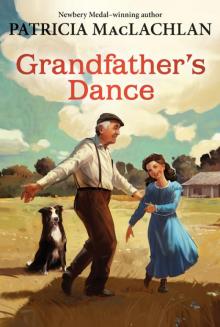 Grandfather's Dance
Grandfather's Dance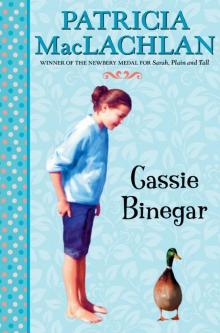 Cassie Binegar
Cassie Binegar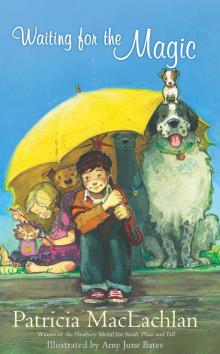 Waiting for the Magic
Waiting for the Magic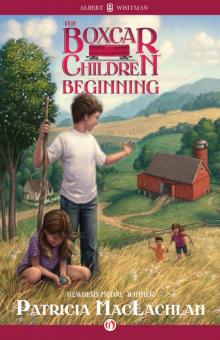 The Boxcar Children Beginning
The Boxcar Children Beginning My Father's Words
My Father's Words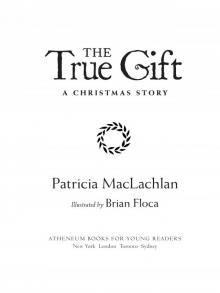 The True Gift
The True Gift